
The 14 Topics
Each topic below represents a balancing act; a relationship can be off balance in either direction. There are two extreme, unhealthy ways of handling each topic, and then there is a healthy middle: The Third Option.
Join us to learn The Third Option and how to work your way to the healthy, middle solution.
RESPECT
This workshop defines respect as the cornerstone of a healthy relationship. Respect means how we treat each other. Participants learn that they can be off-balance in either direction: not respecting others enough, or not respecting themselves enough. Respect is foundational.
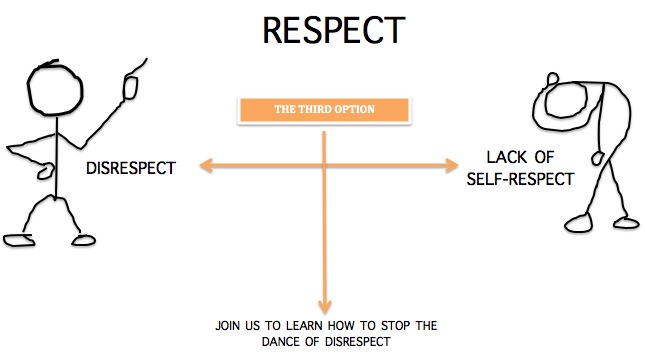
RESPONSIBILITY & THE BLAME GAME
The goal of the “Responsibility & Blame Game” workshop is to demonstrate that a relationship/marriage can be off-balance in either of two extremes: under-responsibility or over-responsibility.
Both are unhealthy for the relationship. Peter Pan is the symbol for irresponsibility, a little boy who doesn’t want to grow up. Atlas represents over-responsibility as he’s holding up the whole world, symbolizing those who take on everyone’s responsibility.
Join us to learn The Third Option and how to work your way there, to the healthy, middle solution.
EXPECTATIONS
The goal of this workshop is to show the role that expectations have in a relationship, and help group members become aware of their own expectations: what they are, how realistic they are, where they came from, and whether or not their spouse shares the same ones. Often our expectations on a subject are very different than our partner’s expectations.
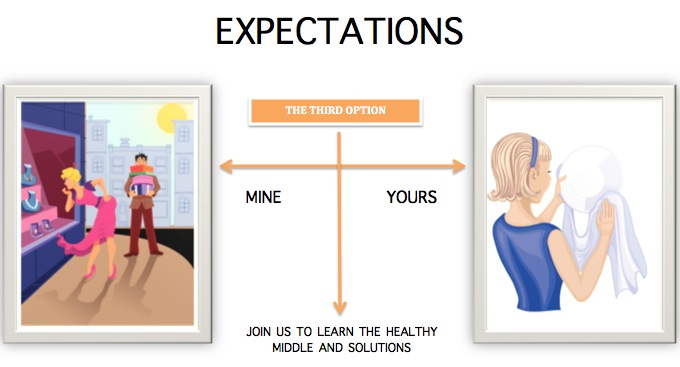
POWER STRUGGLE
How do we go about solving the power struggle when we see it operating in our relationship? The goal of this workshop is to help couples recognize power issues and to teach them how to get their relationships more in balance.

Our partner is not our opponent, but our partner. We are a team! Competition is fine in sports, business, etc. In a romantic relationship, COOPERATION is needed, not competition.
We may think we need to win in our marriage or romantic relationship, but that’s not what we need, because when one person wins, then the relationship loses.
CONTROL ISSUES
This workshop is put together in several parts starting with a discussion of the two sides of the control balance: on one end being “out of control” (or controlled by someone or something else), on the other end, being “overly-controlling”, rigid, needing things to be very predictable.
Control is about autonomy and who controls me, and whom do I control. Neither of these is healthy to a relationship.
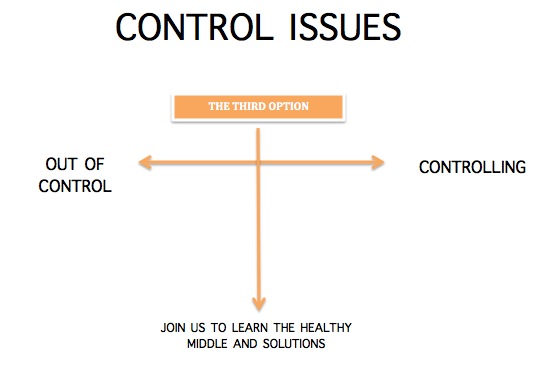
LISTENING
This workshop discusses why and how married/long-term couples stop listening to each other. It emphasizes the absolute necessity of listening in order to have a healthy relationship, and teaches the technique of reflective listening to help couples begin to rebuild their relationship.

For any event or experience, no two people experience it the same way. Listening may solve issues but the goal is merely understanding, not to solve (shown in the fun video below). We may still disagree and need (another workshop), i.e. Conflict Resolution.
PERSONALITY DIFFERENCES
Opposites attract. It very often happens. We tend to “fall in love” with someone who is strong in areas we are not strong. We admire those strengths. We may feel pressure to change, which feeds a constant tension. Why? Because we are different. We don’t want all the same things. We don’t think or feel or act the same. We can begin to feel stuck. Because an intimate relationship involves two different people, the tension between two different ways of thinking is built-in. When we feel this tension, it is not because there is something wrong with our relationship/marriage, it’s because it is the nature of it!
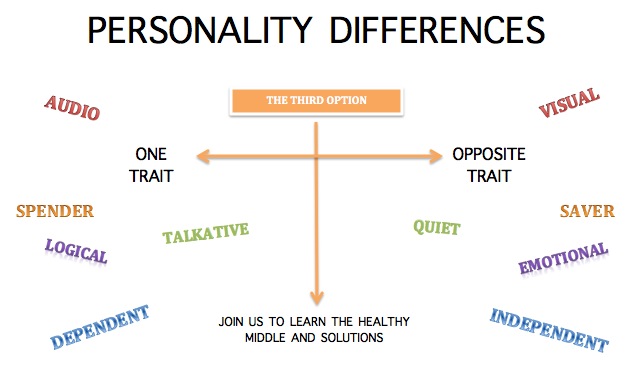
ANGER
A few things to know:
- Anger is a feeling and feelings are neither RIGHT nor WRONG.
- Angry feelings are OK. Angry BEHAVIORS may not be!
Questions to Ponder:
- When angry, am I a “stuffer” or an “attacker”?
- What can I do with my anger?
- How can I begin to deal more constructively with my anger?
- Do I encourage my partner to stuff their anger by refusing to listen?
- Do I allow him/her to direct anger at me that belongs elsewhere?
VIDEO: John Gottman – four negative patterns that can lead to divorce
SPEAKING THE TRUTH IN LOVE
Content Available Soon!
CONFLICT RESOLUTION
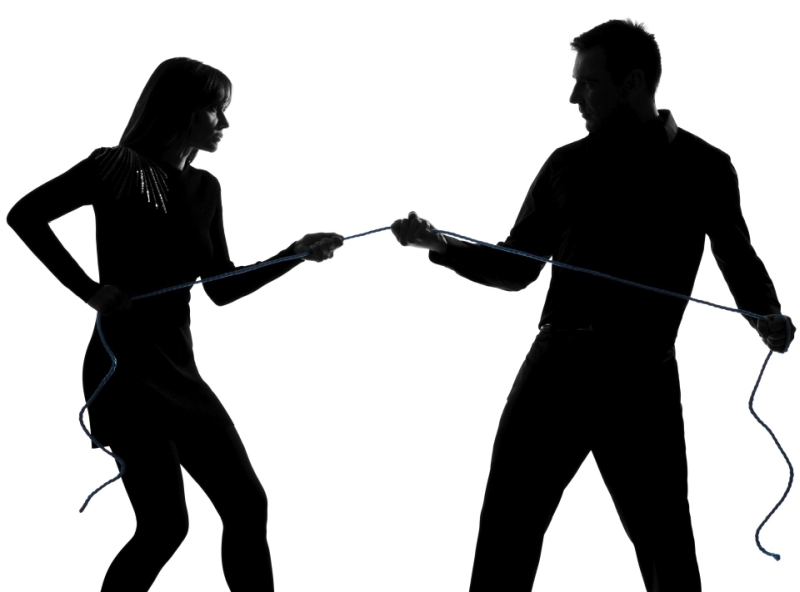
Unhappy spouses may hope that time heals all wounds and the relationship will get better. But the healthy couples try to resolve problems rather than outlast them.” ~Lauer

Self-Reflecting Questions:
- Do I take responsibility in letting my partner know that I feel there is a problem between us?
- Do I turn disagreements into a power struggle to get my way?
- Do I cloud the issue by dredging up past grievances and mixing a lot of issues together?
- Am I willing to compromise?
- Do I refuse to discuss/deal with issues/problems for which my partner has expressed concern or disagreement?
- Do I do everything I can to encourage calm decision and mutual decisions?
FEELINGS & THE HURT SPIRAL
Things to keep in mind with feelings:
- Behind every feeling and/or behavior is a need.
- Feelings are neither right nor wrong.
- There is more than one way to do things.
The hurt spiral is when we claim the right to hurt our partner and justify it because we’ve been hurt, intentionally or unintentionally.
What can we do when we are first hurt? How can we avoid the Hurt Spiral and spiraling down to a damaging and vicious cycle of hurtful words? Join us to learn The Third Option and how to work your way there, to the healthy, middle solution.
FORGIVENESS & REPAIR
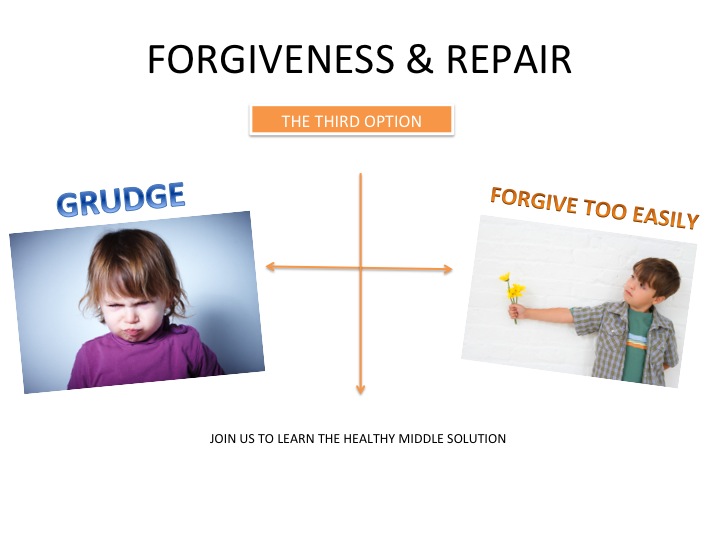
“Forgiveness is surrendering my right to hurt you for hurting me.” ~Hart
Forgiveness is NOT a single act, but a PROCESS. At The Third Option we cover the step-by-step process. The second part to the Forgiveness process is another topic we teach, Rebuilding Trust.
VIDEO: John Gottman video clip, teaching on “Relationship Repair”
REBUILDING TRUST
We can either be “Too Trusting” or “Too Distrusting” (the two unhealthy extremes for this topic)
Too Trusting:
- We want things so badly we make unwise choices
- We might be more gullible
- We set ourselves up for being hurt—more than needed
Too Distrusting:
- We require an iron-clad guarantee
- We don’t give people a chance, and put up a wall of protection
When we rebuild trust, we picture climbing up a ladder, reaching the top where we want to be, home and safe. The top is where we are our truest selves and we trust our partner in healthy way. This is true intimacy. In class we explain the ladder, and what it takes to climb up. We also recognize we sometimes make mistakes and may fall down a few rungs on the ladder, and have to work at going back up again.
Since intimacy is our goal, keep in mind there are many areas we connect intimately: socially, emotionally, intellectually, spiritually, and physically.
CHILDHOOD ISSUES & EMOTIONAL BAGGAGE
When we carry emotional baggage from childhood, it can be:
- anger-rage
- fear-panic-anxiety
- resentment
- guilt-shame-inferiority
- hurt-pain
- depression
In class, we let you know the signs, the unfinished business and the solution, which is the healthy Third Option for this topic.

Have you attended The Third Option and would like to Give Back or Become a Sponsor? CLICK HERE here to support the Third Option.
